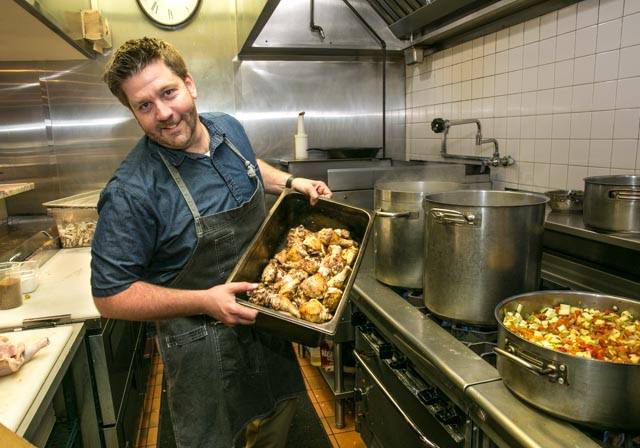In the aftermath of the worst firestorm in Sonoma County history last week, local chefs snapped into action doing what they do best: They cooked.
They cooked for first responders and the people they saved. They cooked for evacuees. They cooked for volunteers who were helping at local evacuation shelters. The resulting meals included homemade sausages, steak and lasagna. They were adorned with fresh vegetables from local farms, fresh bread from local bakeries and lots of love.
All told, chefs from Healdsburg to Geyserville, Sebastopol to Cloverdale prepared more than 3,000 meals last week. At last check, they were at it again this week. And they likely will continue cooking for those in need until somebody, somewhere tells them to stop.
“In times of crisis, you do what you can with the crafts and skills you have,” says Dustin Valette, chef and owner of Valette restaurant. “For us, that meant preparing food.”
Valette served as the de facto point person for many of the efforts, coordinating a dance that involved many moving parts. Every day, he would get a rough sense from first responders and local shelters how many meals they’d need. With this information in hand, he’d message other chefs around the region who had messaged him about how they could help. One day he’d ask a colleague to prepare vegetables for 200. Another day he might ask someone to prep salad for 150.
Participating chefs prepared the food in their own kitchens, then brought it to Valette, where he (and helpers) plated contributions into aluminum containers for transport to the field.
“A hot, home-cooked meal is huge to people who are putting their lives on the line or have lost everything,” Valette noted. “Some of these first responders were eating bread, peanut butter and Clif Bars until we got involved.”
Chefs from all over the region took part in the effort. Among them: Scott Romano from Dry Creek Kitchen, Todd Knoll from Jordan Winery, and Duskie Estes from Zazu in Sebastopol.
Many of these chefs also made food for distribution in their own respective communities. In Healdsburg, for instance, Ari Rosen, co-owner of Campo Fina restaurant, prepared hundreds of lunches and dinners for evacuees at a shelter set up in the Healdsburg Community Center. Up in Cloverdale, after evacuating his wife and twin daughters due to the Pocket Fire, Erik Johnson, chef and partner at The Trading Post, prepared six giant trays of lasagna and brought them to the evacuation center at the Citrus Fair.
In Geyserville, Domenica Catelli, chef and co-owner at Catelli’s restaurant, cooked about 700 meals over the course of the week for evacuees at local shelters and first responders stationed out of the Geyserville firehouse.
“It got to a point where I looked at everything we had the kitchen and said, ‘How can I make the most of what’s left?’” she remembered.
Many chefs hailed local farmers such as Lou Preston from Preston Farm and Winery for dropping off tomatoes, peppers, squash and leafy greens to use in their dishes. Other farmers who donated produce included Bernier Farms in Geyserville and Ritual Farm in Healdsburg. Out-of-area suppliers chipped in food for the effort, too. According to Valette, Golden Gate Meat Co. donated meat, Aloha Seafood Co. dropped off 50 pounds of cooked salmon and Southern Wine & Spirits donated wine.
Even people outside the food industry contributed; Valette acknowledged his wife for running down to Costco to restock aluminum foil, and Mark McWilliams of Arista Winery for chopping onions.
“Some of these contributions sound small, but everything was important to the overall effort of keeping people fed,” said Valette. “All the little things added up to make a huge difference.”
All of the food left an impression on those who needed it most. Evacuees raved about the meals Rosen prepared for them at the Healdsburg Community Center. Grateful first responders posed for pictures with chefs who delivered meals to them on the front lines.
Teresa Gruner, a dispatcher at the Healdsburg Police Department, said she was “taken aback” when she showed up to work at 7 p.m. last Monday to find a fabulous meal in an aluminum container waiting for her.
“it was the most incredible feeling to know these chefs have our backs,” said Gruner. “People look past us a lot of the time, so for them to keep us fed and acknowledge us, it’s a really big deal.”
Moving forward, with evacuation centers overflowing with donations of food, many local chefs said the immediate demand for meals has subsided. Still, these chefs said they will continue to donate meals for first responders, and continue to prep meals for evacuees as needs arise.
A number of chefs also expect to host benefit dinners out of which all profits will be donated to local assistance and recovery funds.
“This will be an ongoing effort,” said Rosen. “Like everyone in the community, we [chefs] will continue to do anything and everything we can to get through this together.”
61.6
F
Healdsburg
April 19, 2025








